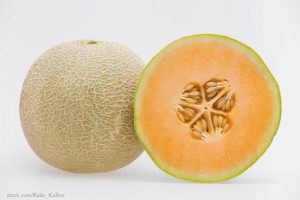The cantaloupe that caused the deadly Listeria outbreak of 2011, wasn’t grown in California, but that outbreak prompted California growers to develop a mandatory food safety program that was in effect during this year’s growing season. Although California produces 75 percent of all cantaloupes sold in the U.S., there has never been a foodborne illness outbreak associated cantaloupe grown in California, and the growers there want consumers to know that they are trying hared to keep it that way.
 “Beginning this year, California cantaloupe farmers and shippers of all sizes will be operating under the only mandatory food safety program that requires government audits of all cantaloupe production activities,” said Steve Patricio, a California melon producer and chairman of the California Cantaloupe Advisory Board (CCAB), which represents all cantaloupe producers in the state. “The CCAB food safety program invites government auditors to inspect all aspects of operations including growing, harvesting, packing and cooling to ensure a set of science-based standards is being followed.”
“Beginning this year, California cantaloupe farmers and shippers of all sizes will be operating under the only mandatory food safety program that requires government audits of all cantaloupe production activities,” said Steve Patricio, a California melon producer and chairman of the California Cantaloupe Advisory Board (CCAB), which represents all cantaloupe producers in the state. “The CCAB food safety program invites government auditors to inspect all aspects of operations including growing, harvesting, packing and cooling to ensure a set of science-based standards is being followed.”
The CCAB, which has operated under direction of the California Department of Food and Agriculture (CDFA) since 1988, ia an industry leader in food safety that developed best practice measures after a Salmonella outbreak linked to imported melon 20 years ago. Over the winter, members unanimously voted to add a mandatory program using United States Department of Agriculture trained CDFA auditors to verify that food safety practices are being following by all cantaloupe producers.
“CCAB is using government auditors instead of private inspection companies to ensure accountability, uniformity and consistency of audits throughout the California cantaloupe industry,” explained Patricio. “Under the program, handlers will be required to be in 100 percent compliance with food safety audits which includes 156 checkpoints.”
The role of third-party auditors was key in the 2011 outbreak. Just weeks before the outbreak, which sickened 146 people and killed 35, the farm received high marks on an inspection from a third-party auditor. This prompted an investigation into the third-party auditing system that the U.S. Food and Drug Administration (FDA) uses to oversee growing and processing facilities. The report, published by the House Energy and Commerce Committee, showed that third-party auditors often don’t conduct audits according to FDA
A program that uses CDFA auditors is meant to avoid problems associated with growers hiring private auditors. “These programs make a lot of sense in today’s fiscally challenging times because they represent a public-private partnership in which government provides a truly independent, third-party inspection service with funding provided by industry rather than the taxpayers,” aid Karen Ross, Secretary of CDFA.
The new program will meet or exceed requirements in the Food Safety Modernization Act when it is implemented. Eventually, consumers will be able to identify California cantaloupes produced under the CCAB program through a certification seal.




